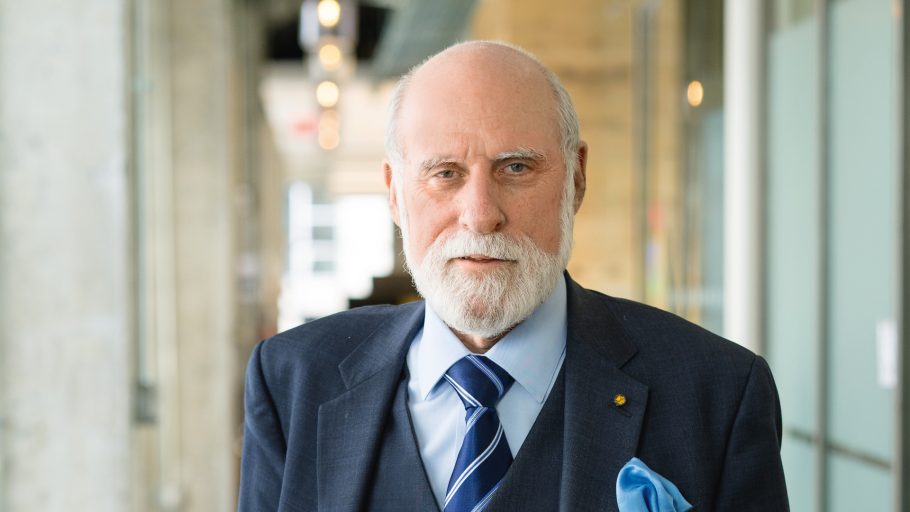You are one of the co-inventors of the Internet and have built a legacy both technically and via your approach to social aspects. What is needed to make sure the Internet continues to grow and prosper with so much change in front of us?
Plainly, further investment in infrastructure to extend access and to maintain and increase resilience. We need more tools such as two-factor authentication for users to secure their access to the Internet. We need to implement IPv6 in parallel with the older IPv4 to be prepared for the Internet of Things and 5G smart phones. We need to help people understand risk factors in online use such as phishing or inadvisable sharing of personal information. We need to teach users the skill of critical thinking to evaluate online content and separate wheat from chaff.
How important is the diversity of the Internet in your opinion? As Richmond’s place is solidified in the connectivity landscape and IP peering and routing takes place in Richmond, what is the importance of Richmond being a new global NAP?
There are two side effects at the least. The first is that the NAP will contribute to increased resilience and reduced latency for better performance. The second is that a NAP will make data center location more attractive in Richmond, assuming other factors such as power and cooling capacity are available and affordable.
What do you see as the importance of subsea cables in the global Internet infrastructure landscape? What do you think are the advantages for Virginia to have direct, lowest-latency and highest-capacity capability in Richmond to Europe, South America and the Caribbean Islands? Does this help, hurt or not affect Ashburn’s importance?
The Internet has the interesting property that new connections make all connections more valuable. The NAP will provide better access to Ashburn for parties routed on the new cables, enhancing the value of the data centers in Ashburn but will also open up new opportunities for Virginia to expand its role in online products and services.
What role do you think universities will play in developing new technology and our future workforce?
Universities are centers of innovation and also the source of many new start-ups. We are blessed with a significant number of high quality universities in Virginia from which to populate existing and growing enterprises as well as new ones. New skills will be needed to be productive in the future and many of those will be gained in our universities.
You are the Honorable Chairman of the Advisory Board of the QTS Richmond Network Access Point (NAP), do you have a message for the industry?
My message is a simple one: smart investment in infrastructure creates the basis for new businesses and growth of existing ones. “Infrastructure” should be interpreted here in a larger sense to include well-educated, skilled workforce, available capital, attractive residential capacity, convenient transportation and the many other features that attract people to the region.
With the Richmond NAP, how do you see this affecting the business climate, economic growth and overall development of the Greater Richmond region? Are there other regions that come to mind that are similarly positioned that the industry should be focused on?
I see the NAP as one part of a more general infrastructure investment strategy (as stated above). There is an example worthy of attention in St. Louis where an innovative infrastructure investment effort is underway and has attracted the National Geospatial-Intelligence Agency (NGA) to open up NGA-west.
InterGlobix Magazine is distributed globally. Do you think we are doing enough globally for the development of the Internet? What driving forces will be most important as the Internet evolves to support IoT, AI, Machine Learning and 5G?
The Internet continues to grow, thanks in part to smart phones and wireless access (WiFi and 4G/5G) as well as dramatic increases in subsea cabling around the world. This infrastructure is making it possible and attractive to develop Internet-enabled devices (think: Internet of Things) and services relating to those devices. We will see significant improvement in healthcare, for example, as continuous monitoring of health indicators becomes more feasible. Machine learning is helping to process massive amounts of data to derive insights we might otherwise miss.
What last message would you leave us with that you feel needs long-term focus and perhaps even increased investment to continue the efforts you and other great luminaries have worked on?
I think we need to consider the side effects of living longer and healthier lives. We will have careers lasting 70-80 years and during that time technology will change societal needs and opportunities for productive work. The smart phone is only 12 years old, but look at what that technology has done to create new applications and work! Think about seven more decades of that kind of innovation and try to imagine how much we will each need to learn in order to maintain our ability to contribute to the economy. We will need to keep learning new skills and acquiring new knowledge. We will need new ways to learn conveniently while continuing to work. Life-long learning will become long life learning!

